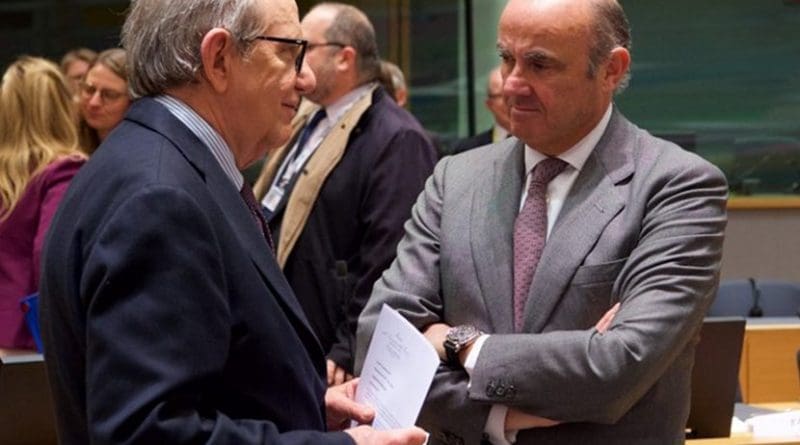Spain’s De Guindos Leads Race To Win ECB Vice-Presidency
By EurActiv
By Jorge Valero
(EurActiv) — Spain’s Economy Minister Luis de Guindos and Ireland’s Central Bank Governor Philip Lane will fight for the ECB vice-presidency to be discussed by the Eurogroup later this month.
Today (7 February) is the last day for eurozone member states to put forward their candidates for Mario Draghi’s ‘number two’ at the central bank’s helm.
Barring some last-minute surprises, the Spanish politician is widely seen as the frontrunner despite some doubts inside the ECB about his political profile.
A senior EU official who spoke to Euractiv took it for granted that De Guindos would be the name picked by the eurozone finance ministers at the next Eurogroup meeting on 19 February.
De Guindos told reporters on Wednesday that both Spain’s prime minister Mariano Rajoy and himself had gathered support for his nomination.
“We believe there is a very clear chance” of getting the post, he added.
“Luis is a man of great quality, a finance minister I always work with very well”, Commissioner for Economic Affairs, Pierre Moscovici told reporters on Wednesday.
Asked about his candidacy, Moscovici said he was not surprised when he found out today that De Guindos would be one of the contenders.
But the Spanish minister still faces a few hurdles. Three sources told EURACTIV.com that some ECB members do not look favourably at the idea of De Guindos taking over from Vítor Constâncio when he leaves on 31 May.
Members of the ECB’s Governing Council prefer a more technical and less political profile for the job.
In contrast, Lane is seen as more suitable for the post, given his strong academic record and his experience in the institution. He has been part of the Governing Council’s decision-making process over the past two years as governor of Ireland’s central bank.
In addition, the Socialist Party in Spain (PSOE) did not support his nomination as it would opt for a woman with a technical profile.
Spain’s Socialist MEPs said that De Guindos “is not the best candidate” not only because he does not meet the European Parliament’s requirement in terms of women representation, but also because “as Eurogroup member, he defended the austerity policies that caused so much harm” to the EU.
Both countries claim certain rights to the vice-president’s chair.
Spain recalls a gentlemen’s agreement under which one of the ECB’s six-member Executive Board goes to one of the four largest EU economies. In addition, Spain currently holds no important position among the EU’s top echelons.
For its part, Ireland says it is the only founding member of the euro area that has never been part of the Executive Board.
Both countries also point to their remarkable economic recovery after implementing rescue programmes (in the case of Spain targeted to its financial system) to win their partners’ backing.
Problems with MEPs
However, both candidates are likely to face similar difficulties in the European Parliament. The chair of the Economic and Monetary Affairs Committee, Roberto Gualtieri, already said last December that the MEPs expected significant female representation in the shortlist for the post.
The Parliament had expressed concern about the monopoly of EU top posts in male hands.
Legislators already delayed the nomination of Luxembourg’s central banker Yves Mersch in October 2012 because of this reason.
The MEPs have won a bigger say in the process and will interview the candidates in a closed-door meeting on 14 February. Only the members of the committee and their substitutes, as well as the political group advisors (but not assistants), will be allowed to attend.
The ECB and the Parliament have only a consultative role and cannot veto the decision. But MEPs could influence the Eurogroup decision on 19 February.
Once the Eurogroup members reach a consensus, the Ecofin Council will vote on their proposed candidate. A reinforced qualified majority of at least 14 from the 19 eurozone finance ministers would be needed to pass on the agreed choice to the European Council in March.
Before the nominee arrives to the EU leaders’ table, he would have to meet again with ECON committee, this time in a public hearing.
Sources from the financial sector told this website that, rather than the vice-presidency, Ireland has in sight for Lane one of the posts that will be available next year in the Executive Council, once Benoit Coeure and Peter Praet leave the institution.
The race for the ECB top posts comes as the bank is under the spotlight for its lack of transparency in handling the resolution of Spain’s Banco Popular and its involvement in the Greek crisis.
Popular was the last victim of Spain’s financial crisis, which forced the government to request a bailout in 2012. That year, Guindos was picked as the worst economy minister of the EU.
Three years later, he lost the race for the new Eurogroup president to Jeroen Dijsselbloem but his stature has since grown.
Today he is not only the most senior Eurogroup member but is also well-respected among his peers.

